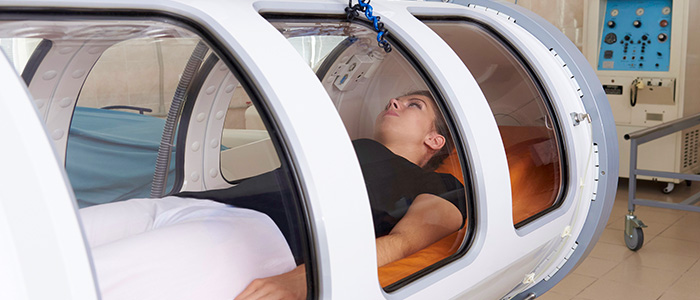Dissociative Disorder and Hyperbaric Oxygen Therapy

Dissociative disorders (DD) are mental disorders that involve a disconnection between thoughts and surroundings. Emotional numbness, out of body experiences, and the loss of personal identities may also be associated with DD. Patients suffering from DD find escape from reality in ways that are involuntary, unhealthy, and disruptive to everyday life.
There are 3 types of dissociative disorders:
- Dissociative amnesia
- Depersonalization disorder
- Dissociative identity
Dissociative disorders generally develop as a reaction to trauma. It is a coping mechanism for long-term exposure to mental and/or physical abuse. Childhood trauma may be associated with the manifestation of DD. Stress may be a trigger and temporarily aggravate the patient’s symptoms, or make them more obvious to those closest to the patient.
Veterans who suffer from post-traumatic stress disorder (PTSD) may develop these disorders as an adaptation to combat exposure. PTSD is a complex, chronic, and debilitating psychiatric disorder that develops in response to severe psychological trauma, and PTSD causes changes in both brain activity and microstructual integrity. PTSD is characterized by intrusive thoughts, nightmares and flashbacks of past traumatic events, avoidance of trauma reminders, hypervigilance, sleep disturbances and persisting dysregulation of the stress response (1). These protracted symptoms lead to considerable social, occupational, and interpersonal dysfunctions. The global cross-national lifetime prevalence of PTSD reported by the World Health Organization (WHO) is 3.9% (2) while among combatants the prevalence can be as high as 30% (3). Unfortunately, the current available treatments, including medications and trauma-focused psychotherapy, have limited effect and nearly half of the patients suffer from treatment-resistant PTSD (4).
No matter what the cause, the effects of dissociative disorders can be profound and debilitating, and patients with this disability qualify for Social Security disability for mental conditions.
Dissociative disorders are generally treated with psychotherapy, with what is termed as talk therapy. Medications are available specifically for the treatment of DD, and may consist of antidepressants, anti-anxiety, or antipsychotic drugs. Hypnosis and cognitive behavior therapy are drug-free alternatives. The current treatment success rate for PTSD and DD is poor. Trauma-focused psychotherapy is currently the treatment of choice, with added pharmacotherapy. Approximately 50% of patients fail to respond to any of the treatments available today.
Advancements in new brain scanning techniques (single photon emission computer tomography, SPECT) have demonstrated that hyperbaric oxygen therapy (HBOT) can make a difference in the altered blood flow of the brain, therefore altering the microstructure of the brain. While studies have been limited and few, HBOT demonstrates a greater success rate for positive outcomes.
If you or someone you know is demonstrating signs and symptoms of dissociative disorder, and you would like more information about hyperbaric oxygen therapy and the treatment we provide, contact Dr. Steven Skaggs, DC, by calling 417-624-4242 or emailing [email protected] for a consultation.
- American Psychiatric Association (2013). Diagnostic and statistical manual of mental disorders: DSM-5. 5th ed. Washington, D.C.: American Psychiatric Pub. 947. [Google Scholar] [Ref list]
- Koenen KC, Ratanatharathorn A, Ng L, McLaughlin K.A. Bromet E.J, Stein D.J et al. (2017). Posttraumatic stress disorder in the World Mental Health Surveys. Psychol Med;47:2260–74. doi: 10.1017/S0033291717000708 [PMC free article] [PubMed] [CrossRef] [Google Scholar] [Ref list]
- Marmar CR, Schlenger W, Henn-Haase C, Qian M, Purchia E, Li M et al. (2015). Course of Posttraumatic Stress Disorder 40 Years After the Vietnam War: Findings From the National Vietnam Veterans Longitudinal Study. JAMA Psychiatry;72:875–81. doi: 10.1001/jamapsychiatry.2015.0803 [PubMed] [CrossRef] [Google Scholar] [Ref list]
- Steenkamp MM, Litz BT, Hoge CW, Marmar CR (2015). Psychotherapy for Military-Related PTSD: A Review of Randomized Clinical Trials. JAMA;314:489–500. doi: 10.1001/jama.2015.8370 [PubMed] [CrossRef] [Google Scholar]
Posted In:
Hyperbaric Oxygen Therapy
